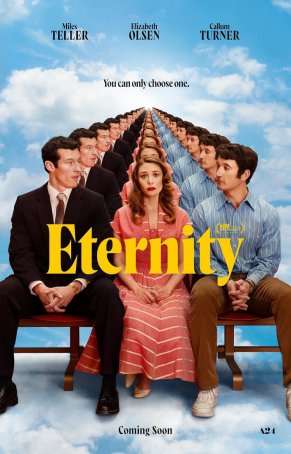
At first glance, Eternity seems to be just an offbeat
rom-com – a trifle about a woman forced to choose between two men. Beneath the
surface, however, there’s more going on. The screenplay, co-credited to
director David Freyne and Pat Cunnane, challenges the viewer to think about
what love really means. Is it the passion of a flaming affair that burns
white-hot for a short time? Or is it something slower, longer, and more
patient: a fusing of individuals through shared experiences and compromises
over the better part of a lifetime? That’s the question Joan (Elizabeth Olsen)
has to answer – is it Larry (Miles Teller) or Luke (Callum Turner)? And she
only has a week to make the decision, a deadline that becomes both a source of
tension and a narrative clock.
In most romantic comedies, there’s a clear-cut rooting
interest and a pretty obvious indication of who’s going to end up canoodling
when the end credits finally arrive. That’s not a flaw; it’s a feature. But it’s
also one area where Eternity upends convention. Because, given the
nature of what’s going on, allegiances switch back and forth with surprising
regularity. The screenplay keeps rejiggering our sympathies, pushing us to
reconsider what we value more: youthful passion or the emotional bedrock of
companionship. And, although it could be argued that the ending is preordained,
I don’t think I really saw it until it was obvious. Although a threesome isn’t
in the cards, I can’t say there weren’t moments when I hoped the movie might at
least flirt with the idea.
Joan is dead. Not at the very beginning of the film, when
she’s a 90-ish woman (played by Betty Buckley), suffering from terminal cancer
but soldiering on for her children, but soon after. Her husband, Larry, who has
been by her side for 65 years, precedes her into the afterworld following an
unfortunate encounter with a windpipe-obstructing pretzel. He awakens in
Eternity’s lobby, looking as he did about 50 years earlier. He doesn’t have to
wait long for Joan to join him. But there’s a complication. Before Joan married
Larry, she was briefly the wife of Luke, a U.S. serviceman who died during the
Korean War. Their romance burned brightly but his sacrifice ended it. Joan
moved on, although she never forgot Luke, and both she and Larry couldn’t help
but occasionally wonder whether she had “settled” for her second husband. In
the afterlife, Luke has been waiting diligently for 65 years, anticipating a
reunion. Now Joan must choose: walk the path not taken with Luke and claim the
future she once imagined, or stay with Larry, the man who shared her entire
adult life and knows her as well as she knows herself—perhaps even better.
Making things more urgent is that there are no do-overs.
Once a decision has been made and a path has been followed, there’s no turning
back. The filmmakers have a lot of fun throwing out options for different
eternities, each with its own slogan and advertising campaign. Regardless of
what future one can imagine, it’s out there. For Luke, it’s a rustic cabin in
the woods with a view to die for (so to speak). For Larry, it’s a crowded beach
resort where the sights aren’t quite as enticing. At first, both men are
convinced Joan is going to pick them. Then, as they begin to realize that the
other might have the upper hand, we see flickers of insecurity and a real fear
of loneliness. They even bond over those shared anxieties.
Although some of the comedy is a little too broad –
assistants Anna (Da’Vine Joy Randolph) and Ryan (John Early) provide purely
comedic accents – the screenplay is pitched at a higher level than one might
normally expect from a movie of this sort. The three leads are all immensely
likable. There’s a great, companionable chemistry between Miles Teller and
Elizabeth Olsen; an easiness to their interactions makes it believable that
they have spent more than half a century tripping over one another. Callum Turner
has the sort of earnestness that turns Luke into a quasi-tragic figure, someone
whose dedication would cause Jane Austen to swoon.
It’s rare that a screenplay surprises me; Eternity is
one of those exceptions. Although unquestionably playing by the rom-com
rulebook, it nevertheless wanders just enough off the beaten path to forge its
own way. It’s quirky, a little unpredictable, and never feels like warmed-over
leftovers. There’s a bite to things – an edginess that doesn’t cut too deeply
but keeps the sentimentality in check. One of the year’s most pleasant
surprises.
Eternity (United States, 2025)
